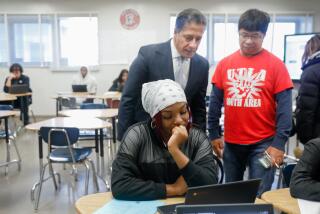Letters: Online education’s place
Re “Putting online classes to test,” July 6
While online classes, remedial and otherwise, have tremendous potential, the fact that about 80% of students enter California’s community colleges deficient in English and math should set off alarms.
Graduation rates are indeed the prime measure of progress, but a high school education that doesn’t educate just gives you a certificate that is not only worthless in the marketplace but devalues graduates who have earned their diplomas.
We must stop pretending and begin the hard task of revamping our system so that the basic skills of reading, writing and arithmetic are mastered before students are allowed to move on.
Glenn Egelko
Ventura
Having pondered the great potential and equal failings of online education that I have experienced and have seen reported, it’s all a “wait and see” bandwagon full of smart scions, puny purses and razzmatazz.
My students who work online for my courses are not left alone; I monitor them closely, remembering that digital educational resources are more apt to expand class size.
What I’ve seen over my 20 years of remediation and recovery teaching is that schools often place the educators lowest in seniority with the least-prepared students. It should be otherwise, for it takes great skill to handle a class with a wide range of abilities.
The big offer I can make to this discussion is to consider peer-to-peer instruction with capstone testing. The teacher-to-student ratio must remain the smallest for those with the most to make up.
Brad Brown
West Covina
ALSO:
Letters: Democracy and Prop. 8
Letters: Digging deeper into miracles
More to Read
A cure for the common opinion
Get thought-provoking perspectives with our weekly newsletter.
You may occasionally receive promotional content from the Los Angeles Times.










